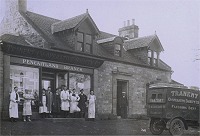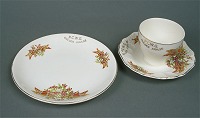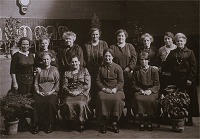Contents ![]() | Institutes of learning
| Institutes of learning ![]() | Sources
| Sources ![]()

Scottish Co-operative Women's Guilds
Page 1 of 2 | Next
The co-operative ventures began in Scotland during the first half of the 19th century. By 1900 co-operative societies were everywhere, from the largest cities to villages so small that they were barely mentioned on the map. They appealed to main the wives of working class men, encouraged by the financial benefits of the dividend and the idea that they were taking part in a social revolution. Despite their loyalty to the movement, however, these women had no say in how it was run.
At that time working class women were, to a large extent, without a voice. They had no vote and outlets for their thoughts on matters regarding their social and financial well-being were very limited. The suffrage movement tended to be restricted to the middle classes. Friendly societies, libraries, improvement societies and Institutes provided a financial safety net and meeting place for the working man. A commentator, Evelyn Sharp, would later note that women "had no recognised rights of [their] own, no independence, and no cultural leisure."

The first proposal to form a Women's Co-operative League was put forward in Edinburgh in 1883. Nine years later the first branch of the Scottish Co-operative Women's Guild opened. Within three years there were 14 branches with almost 1,500 members. Growth continued unabated around 1947, by which time there were 484 branches with over 43,000 members.

Once the guilds began to flourish they showed that they were prepared to discuss topical events. In 1922 the Dalkeith guild discussed female suffrage, the need for policewomen, the effects of unemployment, the peace treaty, how and why women should use the vote, the League of Nations, social reform, old age pensions and the life of Robert Owen. In addition, they sent a suffrage 'memorial' (a letter stating their position) to David Lloyd George (Prime Minister at that time) and put forward a candidate for the parish council election. This tradition of radicalism has not abated with time. At the annual conference of the guilds in 2002 amongst those topics discussed were the minimum wage, the standard of the National Health Service, registration of paedophiles, religious tolerance and the decriminalisation of cannabis.
Page 1 of 2 | Next
In this section:
Women's Co-operative Guilds | Scottish Women's Rural Institute | Literary and debating societies
Contents ![]() | Institutes of learning
| Institutes of learning ![]() | Sources
| Sources ![]()